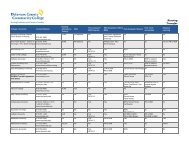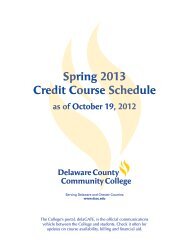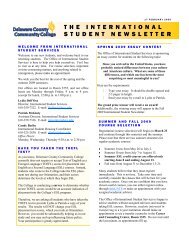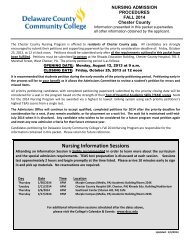2010 Catalog - Delaware County Community College
2010 Catalog - Delaware County Community College
2010 Catalog - Delaware County Community College
You also want an ePaper? Increase the reach of your titles
YUMPU automatically turns print PDFs into web optimized ePapers that Google loves.
104 COURSE DESCRIPTIONS<br />
• Evaluate the basic techniques used in observing<br />
young children.<br />
• Employ effective observing and recording techniques<br />
in an early-childhood setting.<br />
Prereq. ECE 130<br />
3 Credits 3 Weekly Lecture Hours<br />
ECE 140 Curriculum Development<br />
Program Planning and Instruction in<br />
Early Childhood Education<br />
This course presents an integrated approach to current<br />
theories and practices in curriculum development, program<br />
planning and instruction in early-childhood education, and<br />
examines in depth the role of the teacher, curriculum,<br />
program and administration of the early-childhood center<br />
as it relates to the instruction of the young child.<br />
Upon successful completion of this course, students<br />
should be able to:<br />
• Evaluate the principal theories that influence<br />
current curriculum in early-childhood education.<br />
• Analyze the theories and practices that influence<br />
current program planning in early-childhood education.<br />
• Detail the basic problem in implementation of an earlychildhood<br />
curriculum.<br />
• Develop a comprehensive individual theory of<br />
curriculum, program planning and instruction in<br />
early-childhood education.<br />
3 Credits 3 Weekly Lecture Hours<br />
ECE 200 Educating the Culturally<br />
Different Young Child<br />
This course examines the educational needs of young<br />
children who have cultural differences and explores<br />
teaching approaches to accommodate these needs in a<br />
cooperative environment, including parents, school and<br />
community interaction. To assist students in gaining this<br />
knowledge in a well-organized manner, this course is<br />
structured into areas of competence.<br />
Upon successful completion of course requirements,<br />
students should be able to:<br />
• Examine the nature of the culturally different child.<br />
• Assess the significance of the environment to culturally<br />
different young children.<br />
• Justify the importance of a positive learning environment<br />
and curriculum for culturally different young children.<br />
• Detail good educational language experiences for<br />
culturally different young children.<br />
• Explicate concept development of culturally different<br />
young children.<br />
• Cite the teaching-learning strategies for these children.<br />
3 Credits 3 Weekly Lecture Hours<br />
ECE 210 Educating the Exceptional<br />
Young Child<br />
This course examines the psychological, physical and<br />
emotional facets of atypical young children, and methods<br />
for teaching and handling these children. To assist students<br />
in gaining this knowledge in a well-organized manner, this<br />
course is structured into areas of competence.<br />
Upon successful completion of course requirements,<br />
students should be able to:<br />
• State the basic information in this area of education.<br />
• Depict the results of mental retardation.<br />
• Assess speech and language disorder.<br />
• Identify hearing and visual impairment and construct<br />
good learning environments for such children.<br />
• Develop methods of educating handicapped children.<br />
• Determine appropriate learning strategies for educating<br />
disabled young children.<br />
• State various methods for educating emotionally<br />
disturbed children.<br />
• Suggest activities and techniques for educating gifted<br />
young children.<br />
3 Credits 3 Weekly Lecture Hours<br />
ECE 220 Health, Safety and Nutrition<br />
in Early Childhood Education<br />
This course presents health, safety and nutrition practices<br />
essential to prepare early childhood education teachers to<br />
provide and support the total growth of young children.<br />
Upon successful completion of this course, students<br />
should be able to:<br />
• Interpret the state regulations as they pertain to the<br />
health, safety and nutrition needs of children in earlychildhood<br />
education.<br />
• Describe the basic characteristics of an efficient and<br />
effective health-care program for young children.<br />
• Detail the basic components of a nutrition program for<br />
young children.<br />
• Depict the basic component of a safety program for<br />
young children.<br />
3 Credits 3 Weekly Lecture Hours<br />
ECE 290 Administration and Supervision<br />
of Early Care and Education Environments<br />
This course will examine the varied aspects of administration<br />
and supervision in the early care and education environment.<br />
It is designed for early childhood educators who are<br />
or would like to take on an admin-istrative role in an early<br />
childhood program. All administrative aspects of the early<br />
care and education program will be explored with particular<br />
emphasis on the development of interpersonal relationships<br />
and skills needed for effective program management.<br />
Upon successful completion of this course, students<br />
should be able to:<br />
• Identify the varied roles of the early care and<br />
education director.<br />
• Utilize licensing and certification requirements in<br />
decision making.<br />
• Evaluate strategies for staff recruitment, supervision<br />
and retention.<br />
• Analyze enrollment practices and policies.<br />
• Implement effective strategies for working with families.<br />
• Identify personal leadership styles and role in<br />
program adimistration.<br />
• Design the physical environment to meet needs of<br />
children and staff.<br />
• Evaluate communication between parents, staff<br />
and administration.<br />
Prerequisites: AAS or AS in ECE or related field OR<br />
completed 45 hours towards an AAS degree<br />
45 credits towards the ECE degree<br />
3 Credits 3 Weekly Lecture Hours<br />
ECE 291 Current Issues and Trends in<br />
Early Care and Education<br />
This course will examine the current issues and trends in<br />
early childhood education. Through the use of discussions,<br />
debates and disagreement, current issues will be identified<br />
and a generation of solutions will be formulated. The design<br />
of this course is such that the early childhood educator will<br />
become a reflective decision maker.<br />
Upon successful completion of this course, students<br />
should be able to:<br />
• Identify factors that lead to effective leadership.<br />
• Be able to evaluate role of government in early care<br />
and education.<br />
• Learn to advocate for young children.<br />
• Analyze the role of business in early care and education.<br />
• Develop strategies for promoting professional development.<br />
• Develop and maintaining standards of quality improvement.<br />
• Evaluate the quality of early care and education<br />
environments.<br />
• Analyze the role of families.<br />
• Identify supports for special needs children and families.<br />
45 credits towards an ECE degree.<br />
3 Credits 3 Weekly Lecture Hours<br />
ECE 293 Financial Strategies for the<br />
Business of Early Care and Education<br />
This course will examine financial and business<br />
management strategies associated with managing a<br />
childcare center. Topics covered will include marketing,<br />
budgeting, business plans, for profit versus nonprofit<br />
financial strategies; grant writing, enrollment, cost of care<br />
and staffing issues. This course is designed as an<br />
interactive, hands on approach to learning for the center<br />
director or the early childhood professional who would like<br />
to be a center director.<br />
Upon successful completion of this course, students<br />
should be able to:<br />
• Basic principles of accounting and budgeting.<br />
• The advantages and disadvantages of for profit versus<br />
non-profit early care and education centers.<br />
• Business plans and marketing strategies.<br />
• Human resource management.<br />
• True cost of care.<br />
• City and state agencies that provide financial support to<br />
families and early care and education.<br />
• Basic principles of grant writing.<br />
45 credits towards the ECE degree<br />
3 Credits 3 Weekly Lecture Hours<br />
ECO 210<br />
(ECO)<br />
Economics<br />
Macroeconomic Principles<br />
This course is designed to help beginning economics<br />
students comprehend the principles essential for understanding<br />
the basic economizing problem, specific economic<br />
issues, such as, Unemployment, Inflation and the process<br />
by which prices, in competitive markets, are determined.<br />
Students will also study some key aspects of International<br />
Economics, its importance and impact on the domestic<br />
economy. This course will also assist students to understand<br />
and reason accurately and objectively about<br />
economic matters.<br />
Successful completion of this course should enable<br />
students to verbally, graphically and mathematically:<br />
• Show how economic resources and goals relate to a price<br />
system based on supply and demand.<br />
• Explain how the economy can be assessed through<br />
national income accounts (GNP, NI, PI, DI).<br />
• Identify and evaluate the economic consequences of<br />
different trade policies.<br />
• Explain how fixed and flexible exchange rates influence<br />
Balance of Payments accounts: the Current Account, the<br />
Capital Account and the Official Reserve Account.<br />
• Assess the significance of international trade and finance<br />
for the U.S. and world economies.<br />
• Evaluate economic instability and fiscal policy through<br />
classical Keynesian and monetarist models.<br />
• Explain how financial markets, the Federal Reserve<br />
• System and the banking system interrelate in<br />
monetary policy.<br />
Prereq. MAT 060<br />
3 Credits 3 Weekly Lecture Hours<br />
ECO 220<br />
Microeconomic Principles<br />
Microeconomics is a course designed to help beginning<br />
economics students comprehend the principles essential for<br />
understanding the basic economizing problem, behavior of<br />
individual households and firms in market economy, and<br />
how the complex forces of Demand and Supply determine<br />
the prices of goods and services in these markets. Students<br />
will also learn how to analyze several market structures:<br />
Perfect Competition, Monopoly, Oligopoly, Monopolistic<br />
Competition. They will study some key aspects of International<br />
Economics, its importance and impact on the<br />
domestic economy.<br />
Successful completion of this course should enable the<br />
student to verbally, graphically and mathematically:<br />
DELAWARE COUNTY COMMUNITY COLLEGE

















